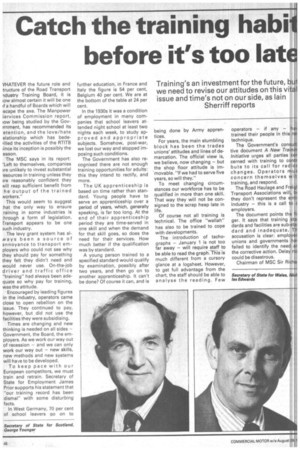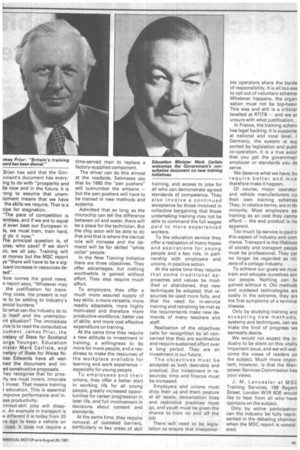Catch the training habi before it's too lat
Page 34

Page 35

If you've noticed an error in this article please click here to report it so we can fix it.
Training's an investment for the future, bu we need to revise our attitudes on this vita issue and time's not on our side, as lain Sherriff reports
VHATEVER the future role and tructure of the Road Transport adustry Training Board, it is row almost certain it will be one if a handful of Boards which will rscape the axe. The Manpower ;ervices Commission report, low being studied by the GovKnment, has recommended its etention, and the love/hate elationship which has bederilled the activities of the RTITB ;ince its inception is possibly the eason.
The MSC says in its report: 'Left to themselves, companies ire unlikely to invest substantial :esources in training unless they 3re reasonably confident they will reap sufficient benefit from he output of the trained workers."
This would seem to suggest :hat the only way to ensure :raining in some industries is :hrough a form of legislation. rransport appears to be one 3uch industry.
The levy grant system has always been a source of annoyance to transport employers who could not see why they should pay for something they felt they didn't need and would never use. On-the-job driver and traffic office "training" had always been adequate so why pay for training, was the attitude.
Encouraged by leading figures in the industry, operators came close to open rebellion on the issue. They continued to pay, however, but did not use the facilities they were subsidising.
Times are changing and new thinking is needed on all sides — Government, the Board, the employers. As we work our way out of recession — and we can only work our way out — new skills, new methods and new systems will have to be developed.
To keep pace with our European competitors, we must train and retrain. Secretary of State for Employment James Prior supports his statement that "our training record has been dismal" with some disturbing facts.
In West Germany, 70 per cent of school leavers no on to further education, in France and Italy the figure is 54 per cent, Belgium 40 per cent. We are at the bottom of the table at 24 per cent.
In the 1930s it was a condition of employment in many companies that school leavers attended night school at least two nights each week, to study approved and appropriate subjects. Somehow, post-war, we lost our way and stopped imposing such conditions.
The Government has also recognised there are not enough training opportunities for adults: this they intend to rectify, and more.
The UK apprenticeship is based on time rather than standard. Young people have to serve an apprenticeship over a period of years, which, generally speaking, is far too long. At the end of their apprenticeship period they are time-served in one skill and when the demand for that skill goes, so does the need for their services. How much better if the qualification was by standard.
A young person trained to a specified standard would qualify by examination, possibly after two years, and then go on to another apprenticeship. It can't be done? Of course it can, and is being done by Army apprentices.
For years, the main stumbling block has been the trades unions' attitudes and lines of demarcation. The official view is, we believe, now changing — but the shop floor attitude is immovable. "If we had to serve five years, so will they."
To meet changing circumstances our workforce has to be qualified in more than one skill. That way they will not be consigned to the scrap heap late in life.
Of course not all training is technical. The office "wallah" has also to be trained to cope with developments.
The introduction of tachographs — January 1 is not too far away — will require staff to be able to read the graph. This is much different from a cursory glance at a logsheet. However, to get full advantage from the chart, the staff should be able to analyse the reading. Few operators — if any — han trained their people in this ne technique.
The Government's consult tive document A New Trainin Initiative urges all parties cor cerned with training to contr bute to its call for radicE changes. Operators mu F. concern themselves wit training, and respond.
The Road Haulage and Freigl Transport Associations will, lai they don't represent the entii industry — this is a call to z: employers.
The document points the fii ger. It says that training star dards and facilities are sub-star dard and inadequate. Th accusation is clear: employer unions and governments ha\ failed to identify the need ar the corrective action. Delay no could be disastrous.
Chairman of MSC Sir Richa
Brien has said that the Govnment's document has every: ing to do with "prosperity and bs now and in the future. It is eong to assume that unemoyment means that we have the skills we require. That is a oipe for stagnation.
"The pace of competition is lentless, and if we are to equal d even beat our European riIs, we must train, train hard, d do it now."
The principal question is, of urse, who pays? If we don't we all pay. Training will St money but the MSC report vs "there will have to be a sigicant increase in resources deted".
\low comes the good news.
e report says, "Whatever may the justification for transring costs, the present is not le to be adding to industry's ancial burdens."
io what can the industry do to p itself and the unemploy!nt situation? The immediate dice is to read the consultative cument. James Prior, the ;retary of State for Scotland orge Younger, Education nister Mark Carlisle, and -;retary of State for Wales N )Ias Edwards have all welned the document and inied constructive proposals. 'hey recognise that for prosity we must invent, innovate i invest. That means training I education. This is essential mprove performance and inase productivity, imited-skill jobs will disaptr. An example in transport is N different it is today from 20 irs ago to keep a vehicle on road. It does not require a
time-served man to replace a factory-supplied component.
The driver can do this almost at the roadside. Estimates say that by 1985 the "pen pushers" will outnumber the artisans — but the pen pushers will have to be trained in new methods and systems.
Admitted that so long as the microchip can tell the difference between oil and water, there will be a place for the technician. But the chip soon will be able to do that and that is where the clerical role will increase and the demand will be for skilled "white collar" people.
In the New Training Initiative there are three objectives. They offer advantages, but nothing worthwhile is gained without effort. They also require much effort.
To employers, they offer a much more assured supply of key skills; a more versatile, more readily adaptable, more highly motivated and therefore more productive workforce; better use of skills; and more cost effective expenditure on training.
At the same time they require a new attitude to investment in training, a willingness to do more for more people, and a readiness to make the resources of the workplace available for learning and work experience — especially for young people.
To employees and their unions, they offer a better start in working life for all young people, greatly increased opportunities for career progression in later life, and full involvement in decisions about content and standards.
At the same time, they require removal of outdated barriers, particularly in key areas of skill training, and access to jobs for all who can demonstrate agreed standards of competence. They also involve a continued acceptance by those involved in collective bargaining that those undertaking training may not be able to command the full wages paid to more experienced workers.
To the education service they offer a realisation of many hopes and aspirations for young people and a key role, in partnership with employers and unions, in positive action.
At the same time they require that some traditional approaches and values be modified or abandoned, that new techniques be adopted, that resources be used more fully, and that the need for in-service training and retraining be met as the requirements make new demands of many teachers and staff, Realisation of the objectives calls for recognition by all concerned that they are worthwhile and require sustained effort over a long period. They are an investment in our future.
The objectives must be accepted as both desirable and practical. Our investment in resources, time and finance must be increased.
Employers and unions must drop their us and them posture at all levels, demarcation lines and restrictive practices must go, and youth must be given the chance to train on and off the job.
There will need to be legislation to ensure that irresponsi
ble operators share the burde of responsibility. It is all too eas to opt out of voluntary scheme Whatever happens, the organ sation must not be top-heav), This was and still is a criticisr levelled at RTITB — and we ar unsure with what justification.
In France, the training schem has legal backing. It is supporte at national and local level. I Germany, the system is s4 ported by legislation and publi co-operation. It is a true axion that you get the government employer or standards you de serve.
We deserve what we have, bu require better and rnus therefore make it happen.
Of course, major operator and vehicle manufacturers rut their own training schemes They, in relative terms, are in tht minority. Most employers set training as an cost they canno afford — the end product is no apparent.
Too much lip-service is paid tc this aspect of industry and corn merce. Transport is the lifeblooc of society and transport people must be professional. They car no longer be regarded as citi zens of a cottage industry.
To achieve our goals we mus' train and educate ourselves anc our people. Nothing can be gained without it. Old methode and outdated technologies are costly in the extreme, they are the first symptoms of a terminal disease.
Only by studying training anc accepting new methods, systems and techniques, can we make the kind of progress we earnestly desire.
We would not expect the industry to be silent on this vitally important issue, and we will welcome the views of readers on the subject. Much more important, however, is that the Manpower Services Commission has your views.
J. M. Lancaster at MSC Training Services, 168 Regent Street, London W1R 6DE would like to hear from all who have opinions on the subject.
Only by active participation can the industry be fully represented in the debating chamber when the MSC report is considered.




































